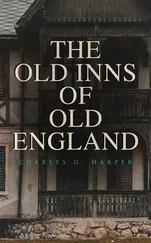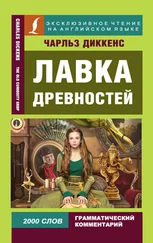Charles Dickens - The Old Curiosity Shop
Здесь есть возможность читать онлайн «Charles Dickens - The Old Curiosity Shop» весь текст электронной книги совершенно бесплатно (целиком полную версию без сокращений). В некоторых случаях можно слушать аудио, скачать через торрент в формате fb2 и присутствует краткое содержание. Жанр: Классическая проза, на английском языке. Описание произведения, (предисловие) а так же отзывы посетителей доступны на портале библиотеки ЛибКат.
- Название:The Old Curiosity Shop
- Автор:
- Жанр:
- Год:неизвестен
- ISBN:нет данных
- Рейтинг книги:3 / 5. Голосов: 1
-
Избранное:Добавить в избранное
- Отзывы:
-
Ваша оценка:
- 60
- 1
- 2
- 3
- 4
- 5
The Old Curiosity Shop: краткое содержание, описание и аннотация
Предлагаем к чтению аннотацию, описание, краткое содержание или предисловие (зависит от того, что написал сам автор книги «The Old Curiosity Shop»). Если вы не нашли необходимую информацию о книге — напишите в комментариях, мы постараемся отыскать её.
The Old Curiosity Shop — читать онлайн бесплатно полную книгу (весь текст) целиком
Ниже представлен текст книги, разбитый по страницам. Система сохранения места последней прочитанной страницы, позволяет с удобством читать онлайн бесплатно книгу «The Old Curiosity Shop», без необходимости каждый раз заново искать на чём Вы остановились. Поставьте закладку, и сможете в любой момент перейти на страницу, на которой закончили чтение.
Интервал:
Закладка:
In one of the pauses of their discourse, and when half the night had worn away, the single gentleman, who had gradually become more and more silent and thoughtful, turned to his companion and said abruptly:
'Are you a good listener?'
'Like most other men, I suppose,' returned Mr Garland, smiling. 'I can be, if I am interested; and if not interested, I should still try to appear so. Why do you ask?'
'I have a short narrative on my lips,' rejoined his friend, 'and will try you with it. It is very brief.'
Pausing for no reply, he laid his hand on the old gentleman's sleeve, and proceeded thus:
'There were once two brothers, who loved each other dearly. There was a disparity in their ages—some twelve years. I am not sure but they may insensibly have loved each other the better for that reason. Wide as the interval between them was, however, they became rivals too soon. The deepest and strongest affection of both their hearts settled upon one object.
'The youngest—there were reasons for his being sensitive and watchful—was the first to find this out. I will not tell you what misery he underwent, what agony of soul he knew, how great his mental struggle was. He had been a sickly child. His brother, patient and considerate in the midst of his own high health and strength, had many and many a day denied himself the sports he loved, to sit beside his couch, telling him old stories till his pale face lighted up with an unwonted glow; to carry him in his arms to some green spot, where he could tend the poor pensive boy as he looked upon the bright summer day, and saw all nature healthy but himself; to be, in any way, his fond and faithful nurse. I may not dwell on all he did, to make the poor, weak creature love him, or my tale would have no end. But when the time of trial came, the younger brother's heart was full of those old days. Heaven strengthened it to repay the sacrifices of inconsiderate youth by one of thoughtful manhood. He left his brother to be happy. The truth never passed his lips, and he quitted the country, hoping to die abroad.
'The elder brother married her. She was in Heaven before long, and left him with an infant daughter.
'If you have seen the picture–gallery of any one old family, you will remember how the same face and figure—often the fairest and slightest of them all—come upon you in different generations; and how you trace the same sweet girl through a long line of portraits—never growing old or changing—the Good Angel of the race—abiding by them in all reverses—redeeming all their sins—
'In this daughter the mother lived again. You may judge with what devotion he who lost that mother almost in the winning, clung to this girl, her breathing image. She grew to womanhood, and gave her heart to one who could not know its worth. Well! Her fond father could not see her pine and droop. He might be more deserving than he thought him. He surely might become so, with a wife like her. He joined their hands, and they were married.
'Through all the misery that followed this union; through all the cold neglect and undeserved reproach; through all the poverty he brought upon her; through all the struggles of their daily life, too mean and pitiful to tell, but dreadful to endure; she toiled on, in the deep devotion of her spirit, and in her better nature, as only women can. Her means and substance wasted; her father nearly beggared by her husband's hand, and the hourly witness (for they lived now under one roof) of her ill–usage and unhappiness,—she never, but for him, bewailed her fate. Patient, and upheld by strong affection to the last, she died a widow of some three weeks' date, leaving to her father's care two orphans; one a son of ten or twelve years old; the other a girl—such another infant child—the same in helplessness, in age, in form, in feature—as she had been herself when her young mother died.
'The elder brother, grandfather to these two children, was now a broken man; crushed and borne down, less by the weight of years than by the heavy hand of sorrow. With the wreck of his possessions, he began to trade—in pictures first, and then in curious ancient things. He had entertained a fondness for such matters from a boy, and the tastes he had cultivated were now to yield him an anxious and precarious subsistence.
'The boy grew like his father in mind and person; the girl so like her mother, that when the old man had her on his knee, and looked into her mild blue eyes, he felt as if awakening from a wretched dream, and his daughter were a little child again. The wayward boy soon spurned the shelter of his roof, and sought associates more congenial to his taste. The old man and the child dwelt alone together.
'It was then, when the love of two dead people who had been nearest and dearest to his heart, was all transferred to this slight creature; when her face, constantly before him, reminded him, from hour to hour, of the too early change he had seen in such another—of all the sufferings he had watched and known, and all his child had undergone; when the young man's profligate and hardened course drained him of money as his father's had, and even sometimes occasioned them temporary privation and distress; it was then that there began to beset him, and to be ever in his mind, a gloomy dread of poverty and want. He had no thought for himself in this. His fear was for the child. It was a spectre in his house, and haunted him night and day.
'The younger brother had been a traveller in many countries, and had made his pilgrimage through life alone. His voluntary banishment had been misconstrued, and he had borne (not without pain) reproach and slight for doing that which had wrung his heart, and cast a mournful shadow on his path. Apart from this, communication between him and the elder was difficult, and uncertain, and often failed; still, it was not so wholly broken off but that he learnt—with long blanks and gaps between each interval of information—all that I have told you now.
'Then, dreams of their young, happy life—happy to him though laden with pain and early care—visited his pillow yet oftener than before; and every night, a boy again, he was at his brother's side. With the utmost speed he could exert, he settled his affairs; converted into money all the goods he had; and, with honourable wealth enough for both, with open heart and hand, with limbs that trembled as they bore him on, with emotion such as men can hardly bear and live, arrived one evening at his brother's door!'
The narrator, whose voice had faltered lately, stopped.
'The rest,' said Mr Garland, pressing his hand after a pause, 'I know.'
'Yes,' rejoined his friend, 'we may spare ourselves the sequel. You know the poor result of all my search. Even when by dint of such inquiries as the utmost vigilance and sagacity could set on foot, we found they had been seen with two poor travelling showmen—and in time discovered the men themselves—and in time, the actual place of their retreat; even then, we were too late. Pray God, we are not too late again!'
'We cannot be,' said Mr Garland. 'This time we must succeed.'
'I have believed and hoped so,' returned the other. 'I try to believe and hope so still. But a heavy weight has fallen on my spirits, my good friend, and the sadness that gathers over me, will yield to neither hope nor reason.'
'That does not surprise me,' said Mr Garland; 'it is a natural consequence of the events you have recalled; of this dreary time and place; and above all, of this wild and dismal night. A dismal night, indeed! Hark! how the wind is howling!'
CHAPTER 70
Day broke, and found them still upon their way. Since leaving home, they had halted here and there for necessary refreshment, and had frequently been delayed, especially in the night time, by waiting for fresh horses. They had made no other stoppages, but the weather continued rough, and the roads were often steep and heavy. It would be night again before they reached their place of destination.
Читать дальшеИнтервал:
Закладка:
Похожие книги на «The Old Curiosity Shop»
Представляем Вашему вниманию похожие книги на «The Old Curiosity Shop» списком для выбора. Мы отобрали схожую по названию и смыслу литературу в надежде предоставить читателям больше вариантов отыскать новые, интересные, ещё непрочитанные произведения.
Обсуждение, отзывы о книге «The Old Curiosity Shop» и просто собственные мнения читателей. Оставьте ваши комментарии, напишите, что Вы думаете о произведении, его смысле или главных героях. Укажите что конкретно понравилось, а что нет, и почему Вы так считаете.











